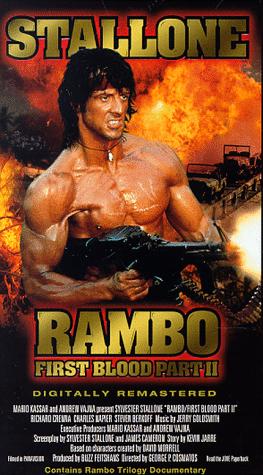
Rambo: First Blood, Part II (1985)

Rambo, subtitled First Blood Part II and continuing the adventures of Sylvester Stallone's one-man army, is two movies in one. First there's a hard-boiled, high-energy, violent action picture, which will probably find a large and enthusiastic audience. Lurking beneath the action is a political statement accusing the U.S. government of such base political motives that I was, quite simply, astonished. RAMBO is not left wing or right wing, but belongs to the paranoid wing of American politics, in which villains left and right crawl under the covers together and conspire to annihilate
If you saw the original First Blood, which was a big hit, you remember Rambo. He is a returned Vietnam hero, a superbly trained fighting machine who is considered by his superior officers to be the finest soldier they have ever seen. But Rambo becomes unhinged by civilian life, and by the insults which he believes society is heaping on men like himself, who risked their lives to fight the war. So Rambo reverts to his military training and turns into a one-man army dedicated to destroying the establishment that does not honor him. At the end of First Blood, Rambo was captured after blowing up half a town and wiping out countless civilian and military authorities. If anyone had been keeping count, he would have qualified as the nation's most prolific mass killer. In the opening scenes of Rambo, he is breaking rocks on a chain gang when his old superior officer (Richard Crenna) arrives with a mission: Rambo is needed to parachute into Southeast Asia and scout out a suspected POW compound holding missing Americans. Any questions, Rambo? "Only one," he tells Crenna. "This time, do we get to win?"
His question places Rambo squarely within the revisionist genre of Vietnam movies, in which the war is refought with a happy ending. Uncommon Valor, the two Missing in Action movies, and this film are all about missions to free American MIAs and kill countless Asian soldiers. The basic assumption is that we lost the war because "the politicians" prevented men like Rambo from doing what they were trained to do. And indeed, again this time he has his hands tied: he's only supposed to take pictures, not engage in violence. Needless to say, if they only want pictures, they've picked the wrong mass murderer for the job. Rambo's mission is outlined by a suspicious American intelligence officer (the square-jawed, rugged Charles Napier, a favorite of Russ Meyer and Jonathan Demme). Only after Rambo parachutes into the night does it become clear that Napier doesn't really want the mission to succeed.
Illogically, the movie argues that it would be politically embarrassing for American MIAs to be found at this late date, and that therefore it would be best if Rambo's mission fails. If he does come back with photos, they'll be suppressed. In that case, why sponsor the mission in the first place--and especially with a loose cannon like Rambo? No matter; the movie turns into an efficient action picture, with Rambo wiping out legions of North Vietnamese and Russians with a variety of weapons, including explosive-tipped arrows. Back at headquarters, Napier does all he can to sabotage the mission, but it becomes clear that Rambo could have won the Vietnam war by himself, had he been unleashed, and everything leads to a big climax, a helicopter dogfight.
Cast:
Sylvester Stallone, John Rambo
Richard Crenna, Col.Trautman
Charles Napier, Murdock
Steven Berkoff, Podovsky
Julia Nickson, Co Bao
George Kee, Cheung Tay
Production Credits:
Producer, Buzz Feitshans
Director, George Pan Cosmatos
Writers, Sylvester Stallone and James Cameron (based on a story by Kevin Jarre and characters by David Morrell)
Cinematographer, Jack Cardiff (Panavision, Technicolor)
Editors, Mark Goldblatt and Mark Helfrich
Music, Jerry Goldsmith